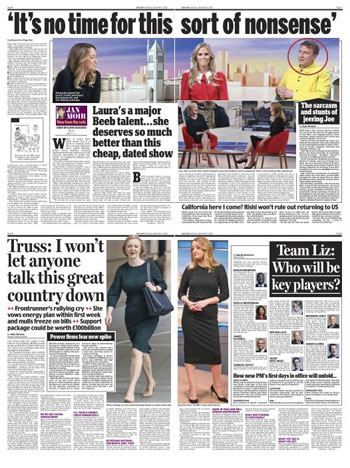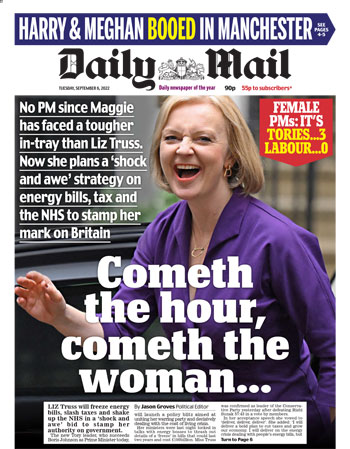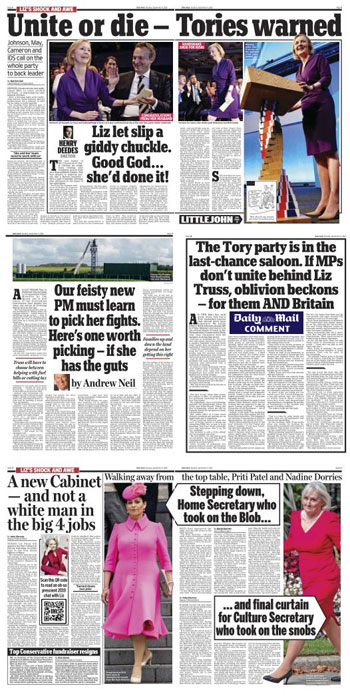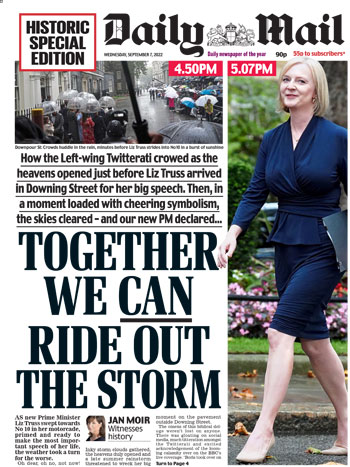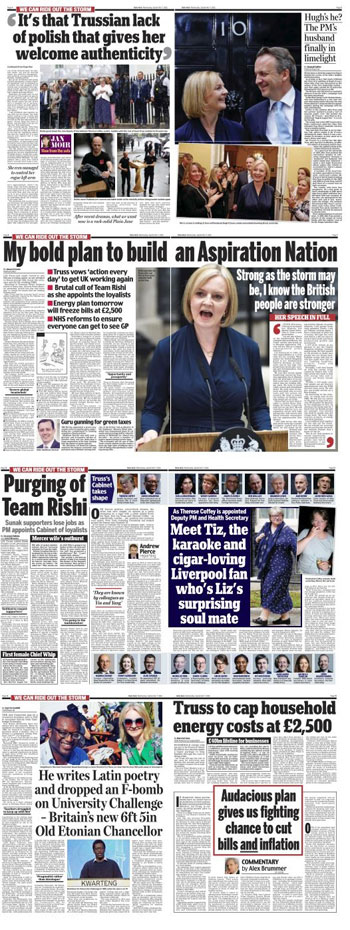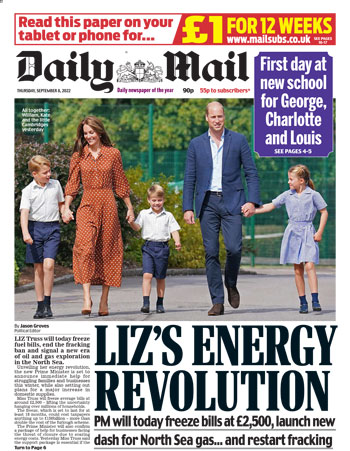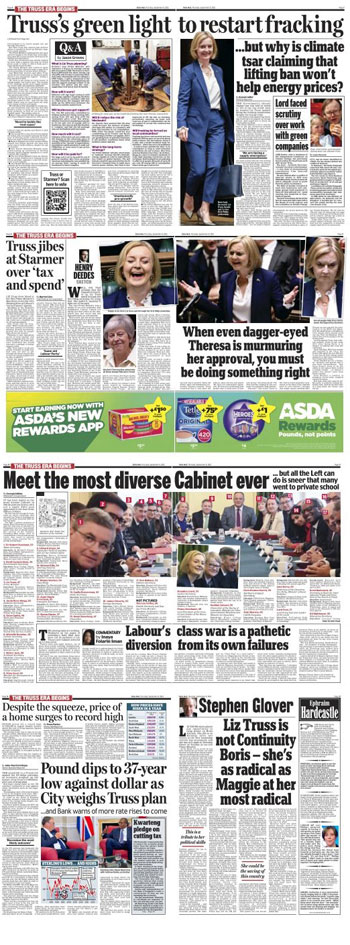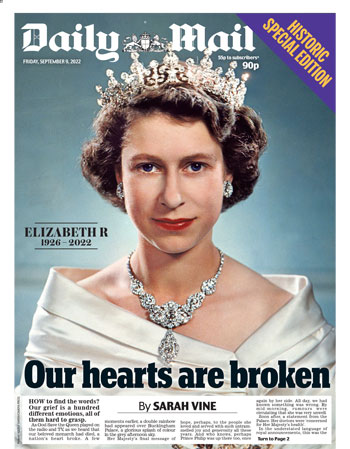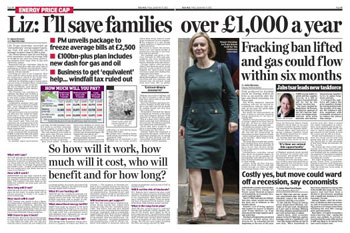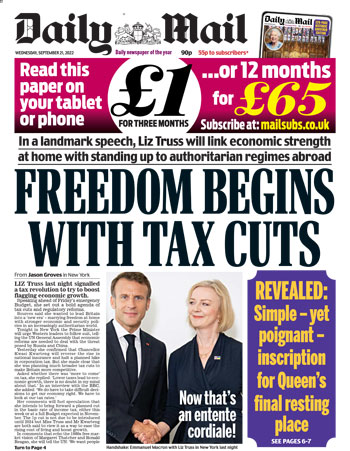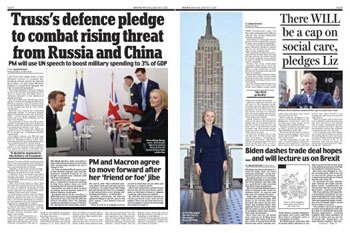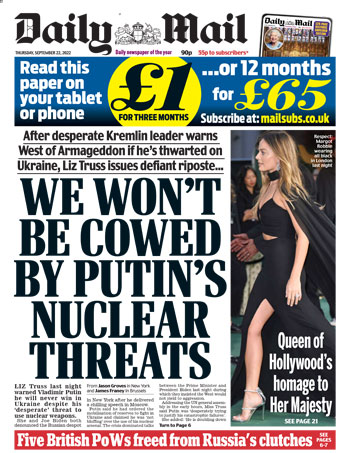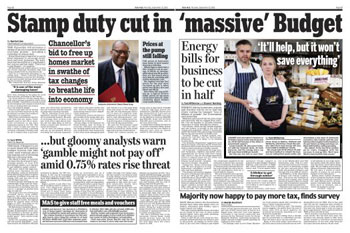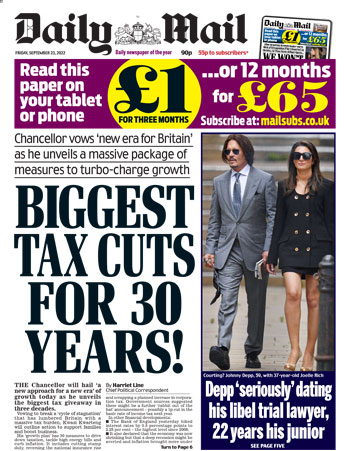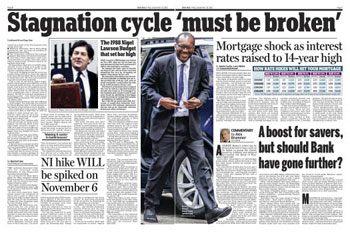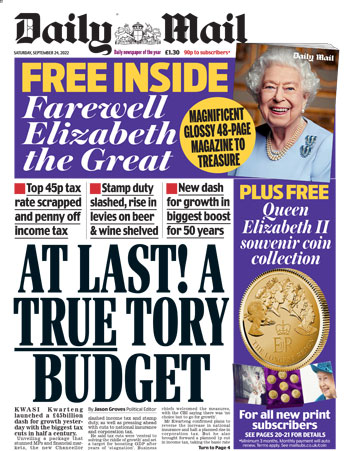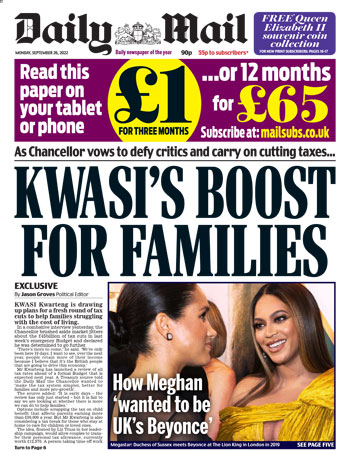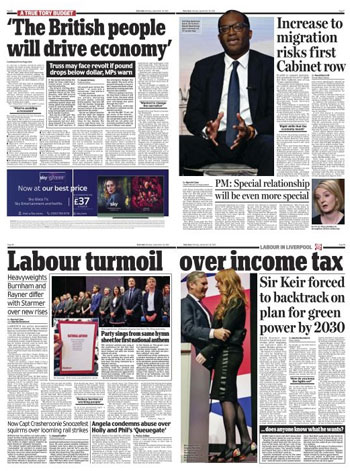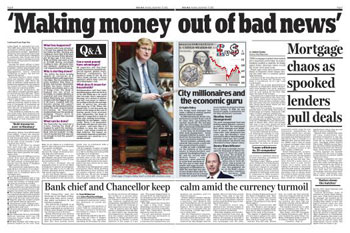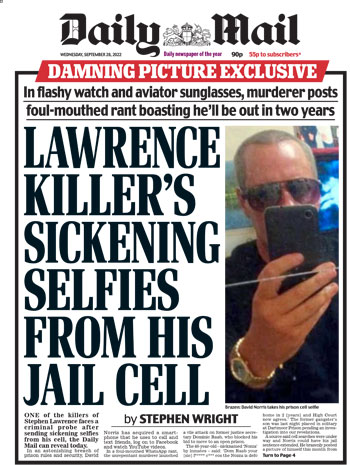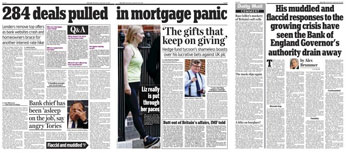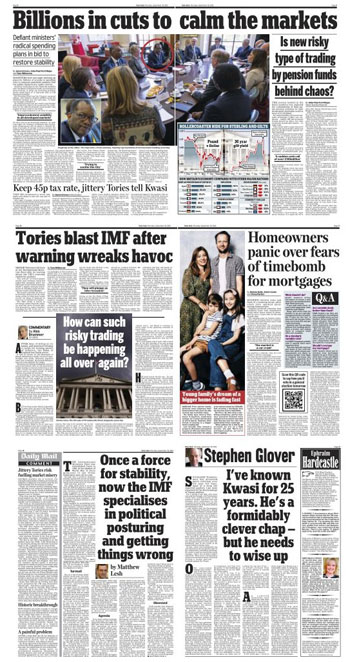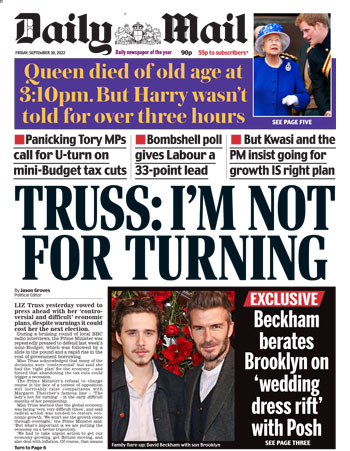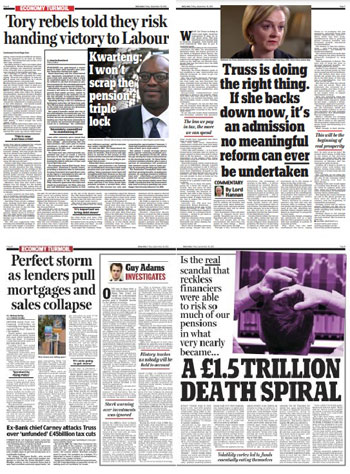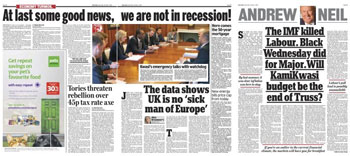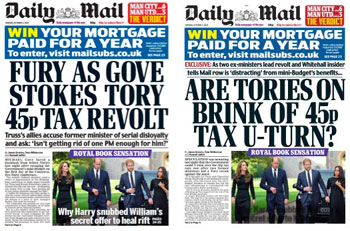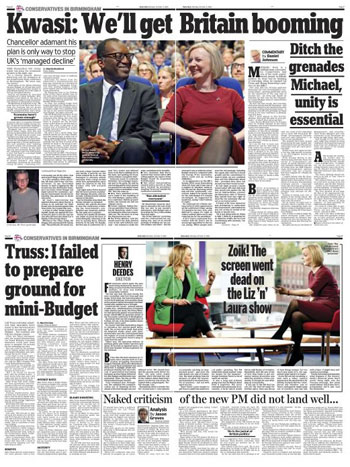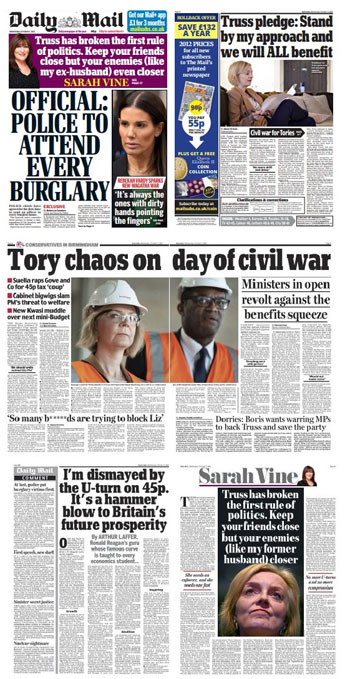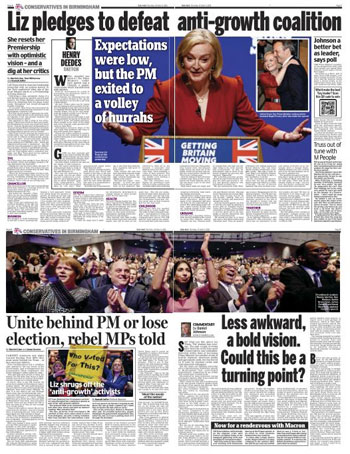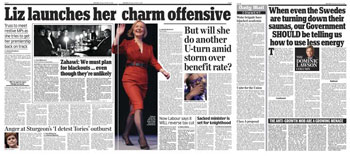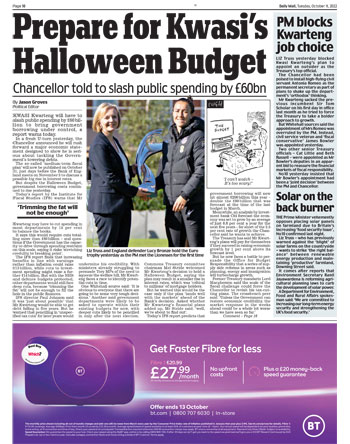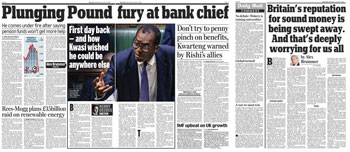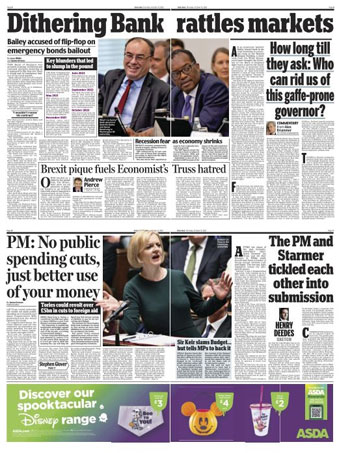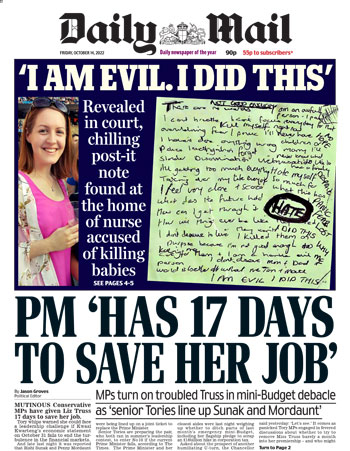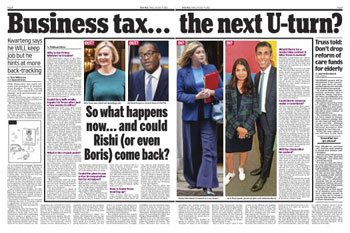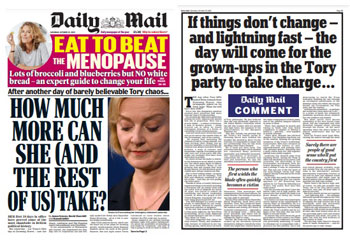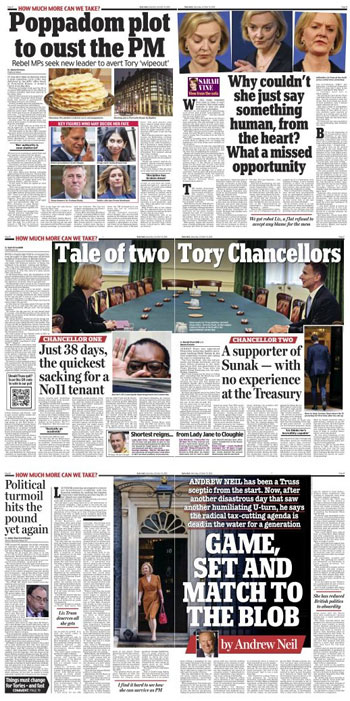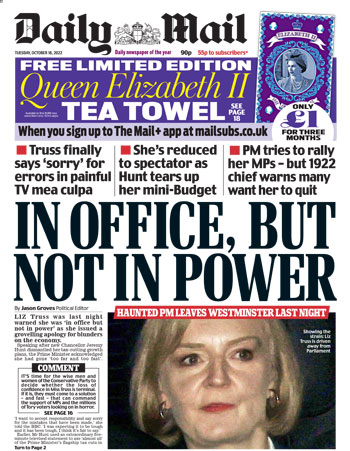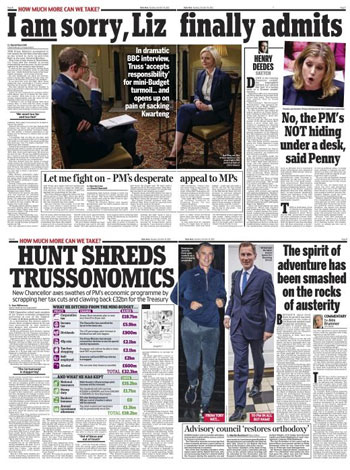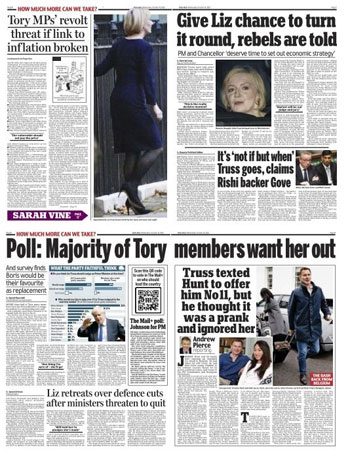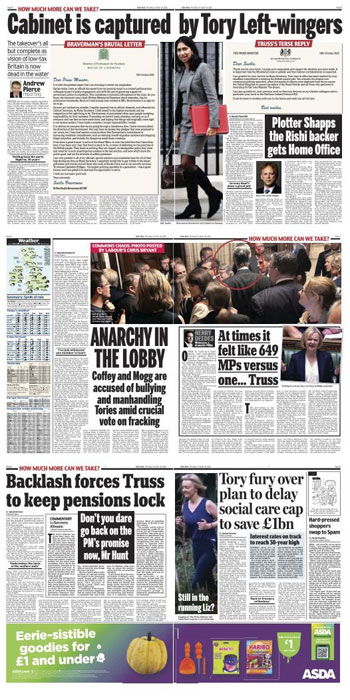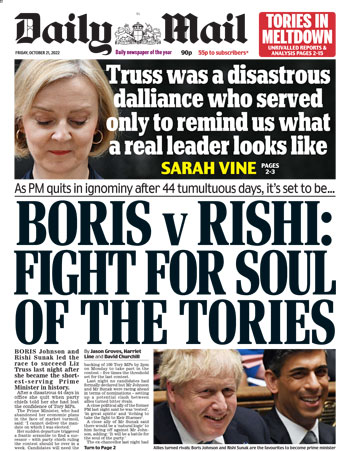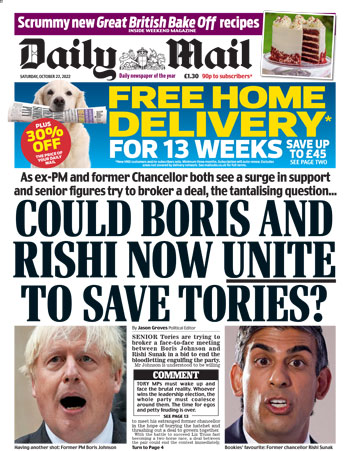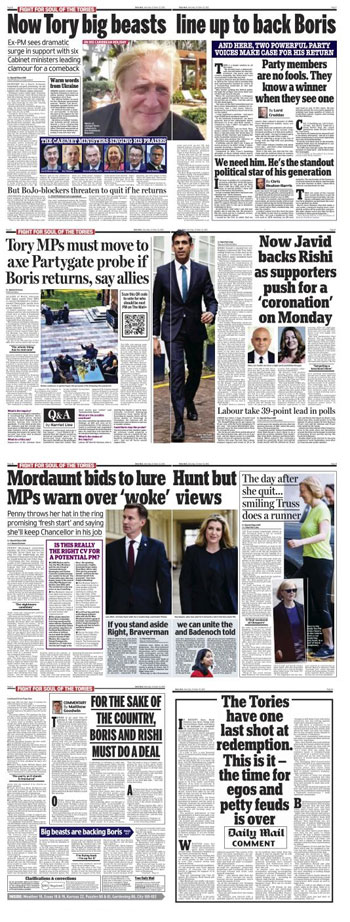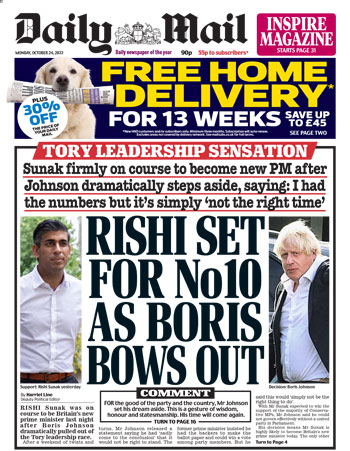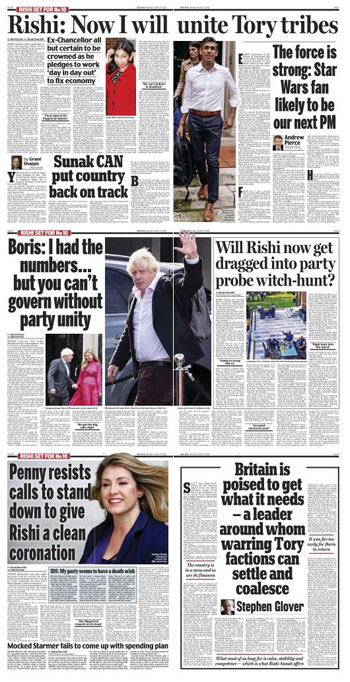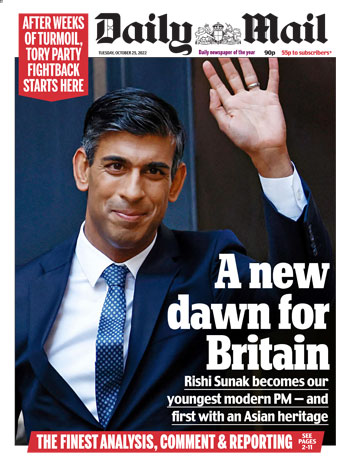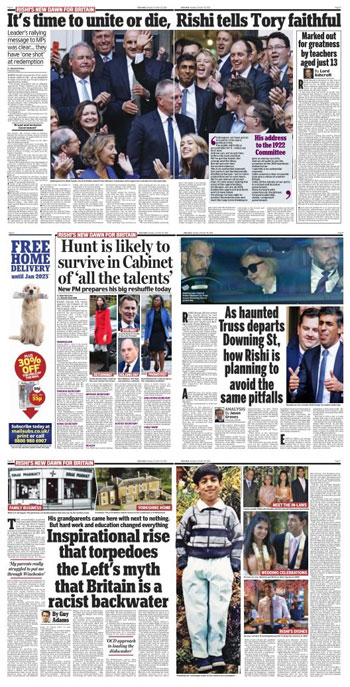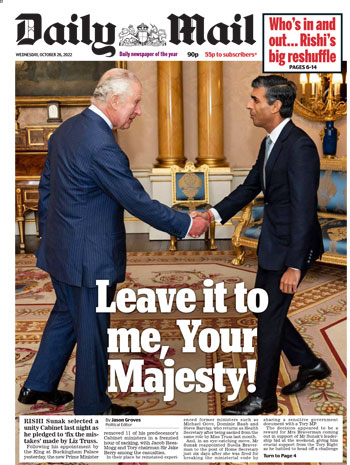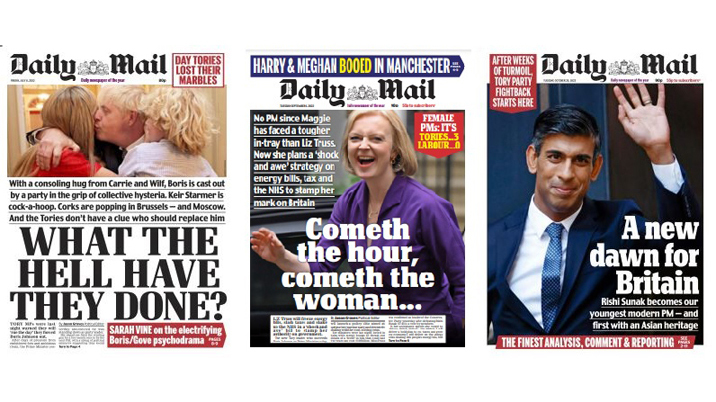
It’s a new dawn for Britain and our new king can apparently leave it to our new prime minister to look after the country. Suddenly, Britain’s biggest-selling and most influential newspaper is putting its faith in Rishi Sunak.
It’s been quite the journey since Boris Johnson was forced out of Downing Street at the beginning of the summer. “What the hell have they done?”, it demanded back then – when it had no doubt that Sunak was the key villain of the piece. For it was his resignation that removed the bung from the dyke and brought the deluge that followed.
It mattered not that Johnson was defenestrated on a matter of integrity; because his ministers weren’t prepared to carry on lying for him. To the Mail, Johnson was a winner with a huge public mandate. Everyone knew his faults, but these should be overlooked in the interests of the bigger picture.
Still, what was done was done and, with only the occasional wistful backward glance, the paper set about making sure it got the person it wanted into Downing Street. And that person was Liz Truss.
Johnson’s resignation and his period as “caretaker” prime minister unwilling to hand over to anyone else or to do anything (other than go on holiday) that might tie the hands of his successor, led to a summer of suspended animation for the country, leaving it without effective government as economic storms built up. It took the Conservative party two months to choose his successor. This did not trouble the Mail, which said members should take their time because they would have only one shot at finding the right person. It took the Mail two days.
While counselling ‘don’t rush’, it was also urging MPs to “coalesce” – a word it would use a lot in the ensuing months – around a unity figure, one who could represent the right and give the membership a “real choice”. In other words someone who could beat Rishi Sunak.
At the time, the Conservatives were some ten points behind Labour in the polls. The Mail was convinced that Labour could never win an election, but it feared that Keir Starmer would “cobble together” a “coalition of chaos” with the SNP, the LibDems and the Greens that might keep the Tories out of office. Now Labour is some 37 points ahead and, if an election were held tomorrow, might very well wipe the Conservatives out. It seems the Mail was right to be worried.
Over the course of that leadership campaign, the Mail promoted and projected Truss way beyond her obvious talents, just as it had done with “strong and stable, crush the saboteurs” Theresa May during the Brexit traumas of the last decade. First it set out to destroy the main threat to her place on the final ballot paper – Penny Mordaunt – and then to discredit the man who was clear favourite for the job – Rishi Sunak. (At the same time, it was punctilious in crediting him for the measures he took, including furlough, to keep businesses afloat during the pandemic. After all, he might win and the Mail would then have to “get behind him” – as it was to urge Tories to do with Truss – and sell him to the country.)
In truth, the Mail had never been a big fan of Sunak, particularly after his NI increase, which was introduced (though the paper prefers not to mention this) to fulfil Boris Johnson’s ambition to “fix social care”.
It didn’t think the public were big fans either. And the overriding priority of its coverage of the Tory party shenanigans since the beginning of July has been electability. Leader after leader has focused not on how a new prime minister might serve the country and improve its inhabitants’ lives, but about the risks of the Conservatives being consigned to oblivion, of Starmer the socialist being allowed anywhere near power.
Threat from the Left
The “Left” (later transformed by Truss into the “anti-growth coalition”) has grown into a monstrous threat that includes not only the official opposition, Nicola Sturgeon, the Civil Service and the BBC, but half the Tory party as well. The appointment of Jeremy Hunt and Grant Shapps to replace Kwasi Kwarteng and Suella Braverman was a “liberal left coup”. Sunak, a committed Brexiteer who is happy to send asylum-seekers to Rwanda and to privatise Channel 4, is not right-wing enough for Ted Verity and Paul Dacre.
To keep Sunak out of No 10, they did all they could to portray Liz Truss as the country’s saviour. She was given three guest columns and two interviews, all of which produced lead stories for the paper. Only Michael Howard was allowed to go in to bat for Sunak.
The paper was delighted by her victory – “Cometh the hour, cometh the woman” – and proclaimed in a leader, “the Tory fightback starts today”. Once installed, she wasted no time in getting Kwarteng to announce the tax cuts and spending spree she had promised throughout the campaign. The ones Sunak repeatedly denounced as fairytale economics.
The Mail message all along was that Sunak was wrong and she was right. When the “fiscal event” took place – so called because it obviated the need for any independent outside scrutiny – the paper was thrilled. “At last!” it cried, “a true Tory budget”.
When the sky fell in, the paper – which prizes loyalty above almost any other quality – stuck with Truss through thick and thin. She had been right, the markets were over-reacting. The Bank of England was to blame, City slickers were to blame. The IMF was to blame. Putin was to blame. Again, the editorials focused on the need for unity, on Tory MPs’ ‘duty’ to get behind the prime minister. Many pints were drunk in many last chance saloons.
One by one, columnists, from Andrew Neil and Sarah Vine to Stephen Glover, expressed growing qualms. But only in her administration’s death throes did the paper itself criticise her – and then for her “bungled” presentation, not her policies. Only at the very bitter end did it desert her.
It’s hard to fault the Mail on grounds of consistency over this period. It has said time and again that the Tories must unite behind their chosen leader, that the economy had been stagnating for too long (under, it must be said, 12 years of Conservative rule), that it is imperative that the party wins the next election.
Everything is viewed through that prism. Where the paper has addressed the hardships families are facing, through – among other things – rising prices and mortgage payments, it has seemed not to have been out of any great concern for their plight, per se, but for fear of how they might in future turn against the government. The paper has a vision of how the country should be run. It may not be to everyone’s tastes, but it has been single-minded in pursuing that vision.
Now, after two months of stasis followed by two months of “crisis”, it has reluctantly concluded that the disloyal former chancellor who got us into this mess – the Mail’s characterisation, not mine – is the man to get us out of it. It seems not to recognise, let alone accept, that it had any part in creating the situation we have found ourselves in. Forever the optimist, it is again claiming – this time on that “new dawn” front page – that the “Tory fightback starts here”.
This, then, is a record of how the paper travelled along that road, all the while believing that anyone but Boris Johnson was to blame for the upheaval in July and that everyone but the Mail was to blame for the chaos that ensued.
Strap yourselves in. It’s a long haul.
July
July 8
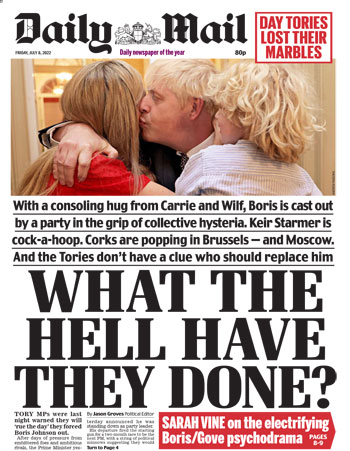
What the hell have they done?
Boris Johnson has resigned and the Mail is beside itself with anger. Besides the splash, there are 18 pages inside, mostly focused on how great Johnson was and what a mistake it was to get rid of him. The first spread to look to the future is 12 and 13, which leads on Liz Truss.
The leader looks back at all of Johnson’s achievements, never mind that he broke the rules and ‘dissembled’, and surveys the field gathering to succeed him:
Nadhim Zahawi has a head for business, but treacherously knifed the prime minister hours after being appointed chancellor.
For standing up to Russia, Defence Secretary Ben Wallace is popular with the grassroots.
But could even his family pick him out of a line-up?
If ex-Health Secretary Sajid Javid and former Chancellor Rishi Sunak really were the paragons of integrity they claim, they'd have spent every waking hour respectively tackling record NHS waiting lists and the cost-of-living squeeze, not plotting to oust Mr Johnson.
By contrast, Liz Truss has performed with great aplomb at the Foreign Office, especially standing up to Brussels' bullying in her battle to fix the flawed Northern Ireland Protocol.
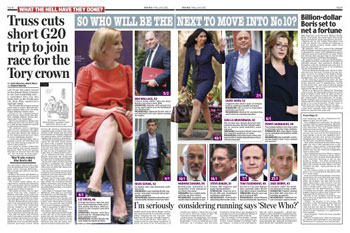
July 9
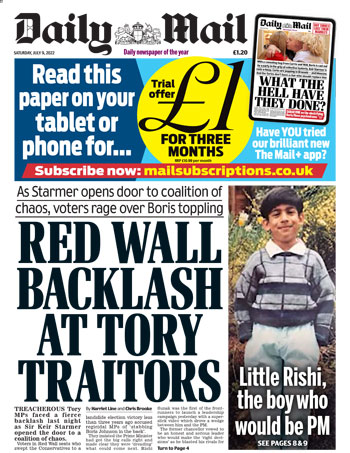
The knives are out for the “treacherous” Tory MPs whose knives were in Boris’s back as the Mail splashes on “Red Wall backlash at Tory traitors”. No names are mentioned, but the third par of the lead notes that Rishi Sunak was the first to declare himself a candidate and a picture of the former chancellor as a boy accompanies the story.
The five inside news pages consider potential candidates, with ‘Slick Rishi’ leading the main spread.
In the comment section, Mick Hume rails at the Brexit-loathing elite and a Saturday essay by Andrew Neil quotes the Wall Street Journal saying, “Britain is in the grip of an inflation crisis that Johnson made worse at every turn.”
The leader is concerned about the prospect of a Labour-LibDem stitch-up that could keep the Conservatives out of power for decades, so says the Tories must not choose their next leader with “undue haste”:
After the candidates are whittled down to two, their policies and suitability for high office must be rigorously tested. After all, the Tories will only get one chance.
Former Chancellor Rishi Sunak yesterday became the first big beast to announce his candidacy. To his immense credit, he is an original Brexiteer, not an opportunist convert, and he emphasises Tory values - aspiration, hard work and family.
However, some won't easily forgive his role in Mr Johnson's downfall.
The leader continues that the paper is keeping an open mind, but it has a tick-list of “true blue” policies: tax cuts, no backsliding on Brexit, tough on Northern Ireland, tighter borders to keep out the “tsunami” of Channel migrants, and ending the wokery infecting our schools and public services.
July 11
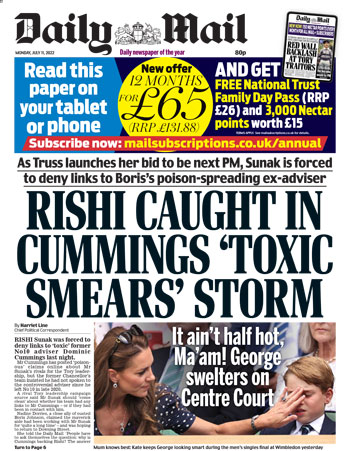
The battle lines are being drawn, as the Mail leader puts it. The smearing of Sunak begins – in the sense that he is caught, according to the splash, in a “Cummings toxic smears storm”. Sunak is not actually doing any smearing. It’s Dirty Dom who is accused of saying nasty things about his potential rivals.
Liz Truss announces that she is standing, earning her the first spread with the heading “I’ll be the unity candidate”, with a sidebar that starts “forget Rishi”. The Mail is already gunning for Penny Mordaunt, with her being accused of gaffe and wokery on the second inside spread.
The leader produces the first almost-endorsement for Truss:
Mr Sunak insists tax cuts are not possible until we begin clearing our eye-watering Covid debts. Others, however, are determined to wrestle back the Tories' reputation as a low-tax party to spur growth.
Pleasingly, several agree with the Mail's tireless campaign to spike the foolish and damaging national insurance hike, which callously hit voters at the moment the cost of living squeeze began biting viciously.
Liz Truss is one. She's also hugely experienced and, as Foreign Secretary, has been strong on Ukraine and the Northern Ireland protocol. During her Westminster career, she has cleared every obstacle placed in front of her - much to her detractors' irritation…
Ex-Health Secretary Jeremy Hunt, however, is a non-runner for huge swathes of the party after calling for a brutal China-style lockdown and his pro-EU sympathies.
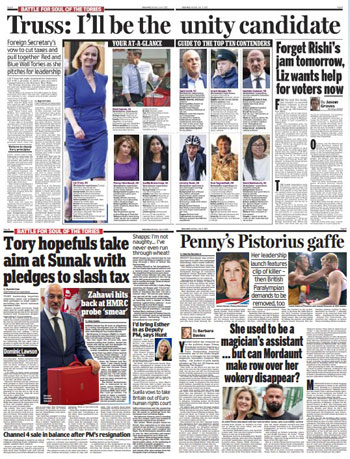
July 12
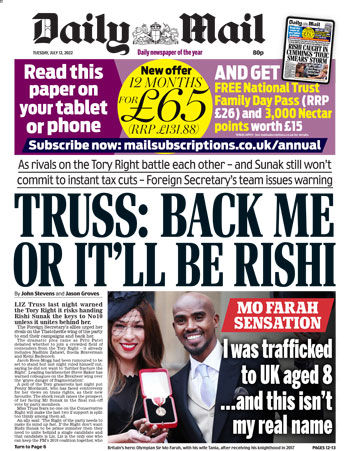
The “stop Rishi” campaign is in full flow, with Truss making the splash with “Back me or it’ll be Rishi”, the inference being that the Mail thinks that would be a bad thing. And to press home that point subtly, the previous day’s “Rishi smears” front page is republished next to the titlepiece as part of a puff for a subscription offer.
Truss is the main picture on the first spread of five inside pages, the second has Sunak promising to cut taxes after he’s got a “grip” on inflation (the Mail’s quote marks on grip) but being rejected by Lord Frost. A small downpage story reporting polls suggesting that Mordaunt would beat Sunak in the final runoff may look insignificant, but…
The leader – “Tory activists must be given a proper choice” – notes that only Sunak is making a virtue of not cutting tax until inflation is under control and is sceptical of some other candidates’ promises. Sunak is the strong favourite, so far, but the Mail says his record on taxation is shameful and that he has blotted his copybook with his “key role” in toppling Johnson. “If the Right of the Tory party want to stop a Sunak coronation, they must unite behind a single candidate to avoid the risk of splitting their vote. It is imperative that aspirants look long and hard at themselves - and each other - and ask honestly: Who is best placed to beat him?”
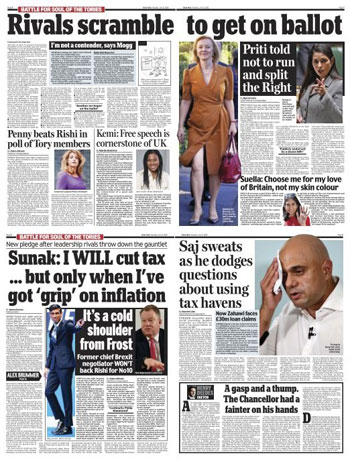
July 13
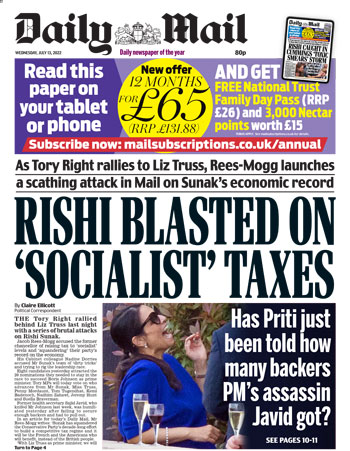
Nominations close and to the Mail’s delight, “Boris assassin” Sajid Javid fails to secure the necessary twenty backers. That leave eight in the ring. With Sunak looking the front-runner before the first ballot, Jacob Rees-Mogg throws his weight behind Truss and writes a page 4 piece for the Mail, attacking Sunak’s tax record. This also makes the splash as “Sunak blasted on ‘socialist’ taxes”.
The first of three inside news spreads is devoted to Javid schadenfreude, the second has Sunak defending his record alongside a colour piece headed ‘Folksy sincerity oozed out of golden boy’s every pore’. The third is an attack on “Part-time Penny” who apparently doesn’t know what a woman is.
A short leader – “Time for pragmatism” – says that the Right must coalesce around one candidate with one thing in mind: who is best placed to beat Keir Starmer.
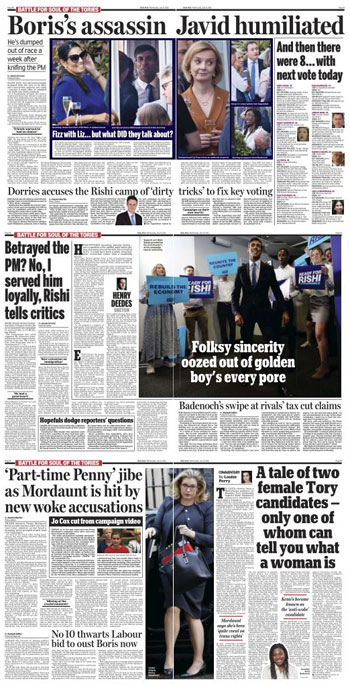
July 14
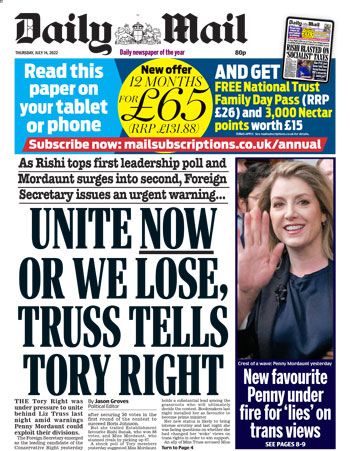
The first MPs’ ballot sees Hunt and Zahawi eliminated. Sunak tops the poll with 88 votes and Mordaunt is second with 67. For the Mail, the most important thing is that Liz Truss garnered 50 votes. She makes the splash with, “Unite now or we lose, Truss tells Tory right”.
The story says that bookmakers have installed Mordaunt as favourite and that her “new status” was likely to bring intense scrutiny. Questions were already being raised about whether she had changed her “woke” views to win support. The main picture is not of Truss telling the right to unite, but of Mordaunt “under fire” for “lies” on trans views.
There’s a lot more of that in the body of the leadership coverage, but Mordaunt also shows up on page 4 – without fanfare – in a bylined piece, “Why I will ALWAYS fight for this great nation”, talking about the importance of maintaining and increasing defence spending, the battle for Ukraine, and why she wants the top job.
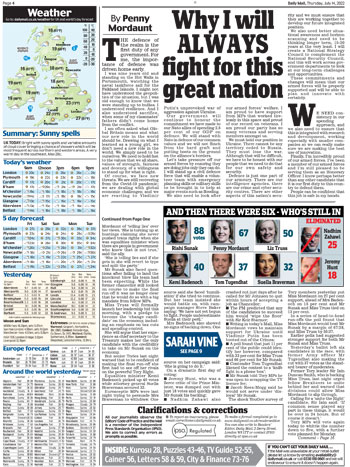
Then it’s back to business as usual with more Mordaunt backlash on page 8, followed by “Is a shadowy ex-sex party organiser secretly helping Sunak?”, and finally Truss promising to hit the ground [running].
The first leader calls for the Tory right to “get real”:
Truss, has distinguished herself in Cabinet and on the international stage. She is the obvious choice for those who don’t want Sunak or Mordaunt.
The second, “Questions for Penny” urges Mordaunt to “come clean” on her views on gender recognition; the third, headlined, “Defying the doomsters”, notes that the British economy “seems to be doing rather well”.
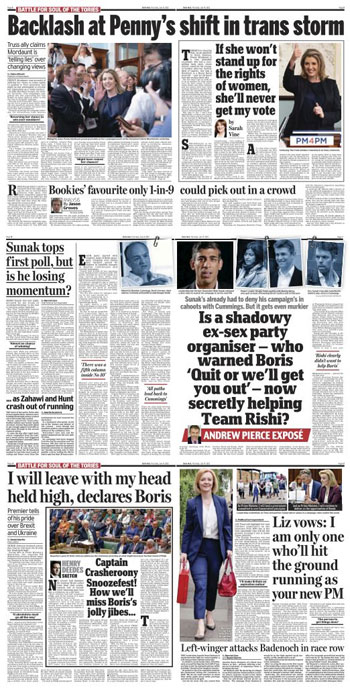
July 15
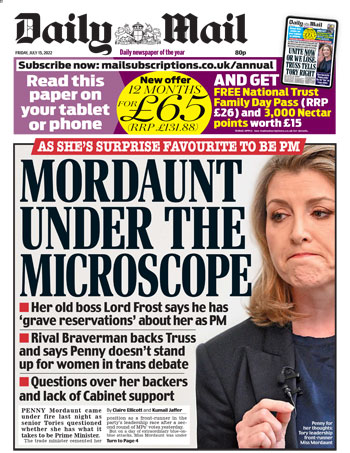
Braverman is eliminated in the next MPs’ ballot. Sunak is still ahead, Mordaunt still second, Truss still third, but gaining.
Yesterday’s Mail splash that Mordaunt was likely to face intense scrutiny proves prescient as here she is again on the front page under the headline “Mordaunt under the microscope”.
Inside, two of the three news spreads are devoted to attacking her, while the third is a “booster” for Liz and her “true blue” message, plus a reminder of Sunak’s disloyalty with “So, when did Rishi decide to knife old boss Boris?”
The leader sustains the assault on Mordaunt and encourages Kemi Badenoch to step aside to clear way for Truss:
A candidate who does have a strong and demonstrable Cabinet record is Foreign Secretary Liz Truss.
She embodies the values of traditional Conservatism - low tax, aspirational, meritocratic, anti-woke. And unlike the other front-runners, she remained loyal to Boris to the end. Significantly, she has the endorsement of Lord Frost.
Miss Truss advanced strongly in the second MPs' vote yesterday but remains in third place. She will no doubt harvest many of the eliminated Suella Braverman's votes, but they will not be enough.
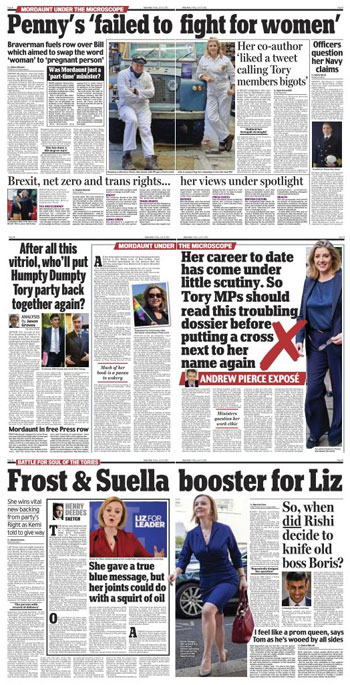
July 16
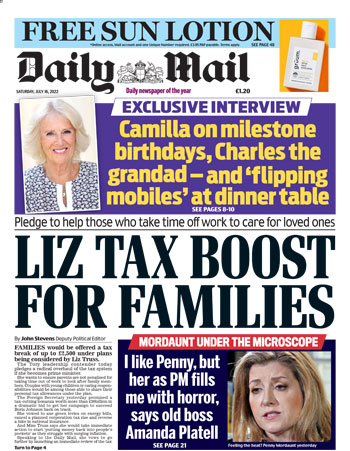
Liz Truss is back in pole position on the front after giving the Mail an interview in which she says she is considering changes to the tax system so that parents can take time off work to care for their families. This is rendered “Liz tax boost for families”. Again, this story is accompanied by a photograph of Penny Mordaunt, again “under the microscope” – this time with Amanda Platell saying that the thought of her being PM fills her with horror.
The three inside spreads have Truss “laying into Rishi” in the first TV debate, Mordaunt being incapable of organising a tea party and a Sunak “petrol bombshell” – he apparently wanted a green levy of fuel that was blocked by No 10. A sidebar on this spread says that as a student he was regarded as not ruthless enough for politics – “and then he knifed Boris”. Another black mark is that he has been endorsed by China.
The leader repeats the mantra that we shouldn’t be having this contest, Boris was best. Mordaunt is hopeless, Badenoch too inexperienced. Sunak was an excellent chancellor through Covid, but brought us the highest taxes for 70 years.
The other candidate of proven ability in a range of cabinet posts is Liz Truss:
As she showed in last night's debate, she's not as polished a public performer as some others. However, call us old-fashioned but at this paper we value substance over style.
In that department, she has consistently shown her mettle. She has negotiated trade deals around the world, stood up to the EU over Northern Ireland and has been unfailingly resolute on Ukraine.
Today she unveils imaginative plans to ease the financial burden on hard-pressed families and carers with targeted tax cuts. Along with pledges to reverse the National Insurance rise, hold down corporation tax and scrap some green levies, she offers true Tory solutions to real-world problems.
Not only is she the candidate with the most impressive CV, but also the one who most embodies the Conservative principles of aspiration, family values and low taxes.
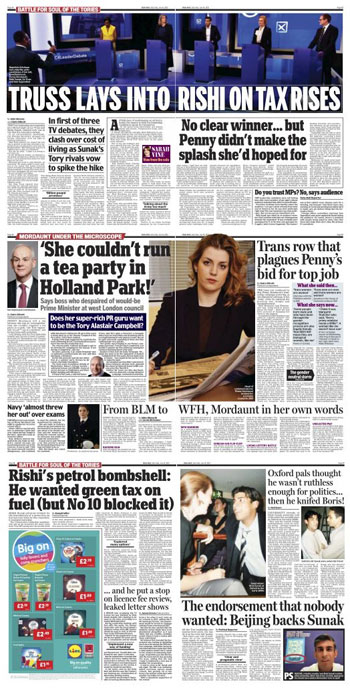
July 18
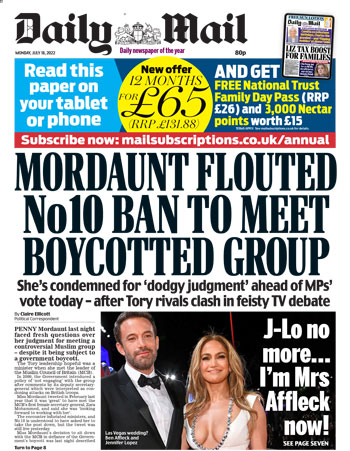
The “stop Penny” juggernaut ploughs on with a lead on her meeting the leader of the Muslim Council of Britain when the Government had a policy of “not engaging” with the group. The meeting had taken place 17 months earlier and she tweeted about it at the time, but it is now splashworthy.
Inside, coverage of the race includes a spread expanding the criticism of Mordaunt, a second on the previous night’s TV debate, with “Liz lashing out at Rishi”, and a single page headlined, “Tax cuts aren’t a fairytale Rishi”.
The leader reiterates the paper’s view that Tory members must be given a “real” choice. Sunak and Mordaunt are too like-minded and Mordaunt is unsuitable. Badenoch or Truss must get on the final ballot paper, preferably Truss.:
Mr Sunak repeated his warning that to cut taxes now would be unwise, promising only jam tomorrow. Does he understand that people are facing genuine hardship?
In contrast, Miss Truss demonstrated her passionate commitment to low-tax, small state Conservatism, by promising to ease the burden on hard-pressed families immediately, rather than waiting for some hypothetical future date.
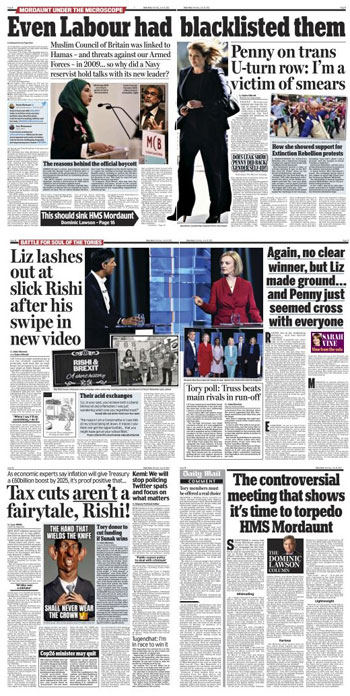
July 19
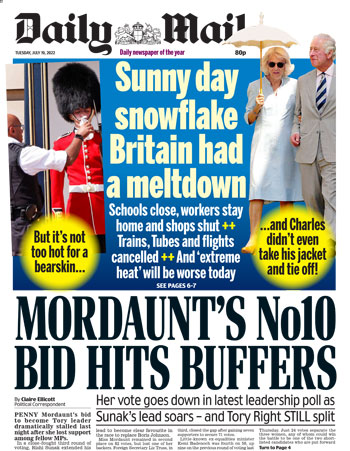
Tom Tugenhat is eliminated in the fourth ballot. Sunak, Mordaunt and Truss are still the top three, but Mordaunt saw her vote decline, prompting the splash “Mordaunt No 10 bid hits the buffers”.
There is surprise, however, that Sunak remains so far in front as supporters of Suella Braverman, who was eliminated in the previous round were expected to line up behind Truss and that didn’t seem to have happened.
The first of three inside spreads therefore has the Sunak camp being suspected of dirty tricks to ensure that he doesn’t face Truss in the final vote. This has shades of the final MPs’ ballot in 2019 when Boris Johnson supporters were said to have ‘lent’ their votes to Jeremy Hunt to make sure Michael Gove didn’t make the final cut. The Mail doesn’t mention this though.
This spread is, however, dominated by the rise of Badenoch.
The second is devoted to a further attack on Mordaunt – ‘Another boss blasts part-time Penny’ – and the third has more blasting. This time, barnstorming Johnson blasting the plotters who unseated him. He gave this bravura address in the Commons, but is photographed rocking a Top Gun Tom Cruise look in – and walking away from a warplane.
That word is back again in the leader as the Mail tells the right to back Truss:
Traditionalist MPs must wise up and coalesce behind one candidate. Miss Truss is the obvious choice, given her strong track record and she is best placed to overtake Miss Mordaunt.
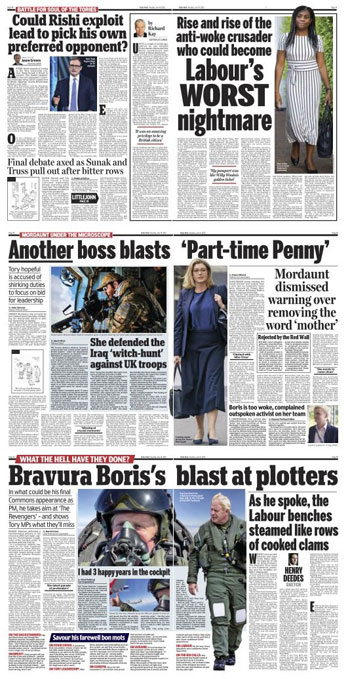
July 20
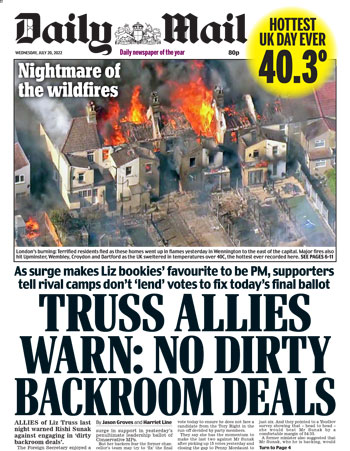
Badenoch is eliminated in the next ballot, leaving just Sunak, Mordaunt and Truss in the race. For some time, polls have suggested that either of the women would beat Sunak in the final vote and the Mail is determined that it should be Truss.
The splash has her allies warning the Sunak team against ‘dirty backroom deals’ to get Mordaunt on the final ballot paper to avoid facing Truss.
Inside, the first of two spreads says Truss is now the grassroots favourite and has a Jason Groves analysis describing Sunak’s team as being masters of the “dark arts”. The second is another attack on Mordaunt. This time it’s “Penny in trade storm” and suspicions that she will try to rewrite history.
The leader dismisses Mordaunt (again) as unsuitable and says that Sunak supporters are suspected of deploying dirty tricks against Truss, who is “building up a formidable head of steam”:
A cynical stitch-up would be an antidemocratic outrage, denying activists a choice between Conservative ideologies.
This paper has always argued the last battle should be between Miss Truss and Mr Sunak. Both are experienced politicians. Both have deftly handled daunting Cabinet challenges. But Miss Truss is a low-tax, small-state Tory and Mr Sunak is closer to being a third way liberal.’
July 21
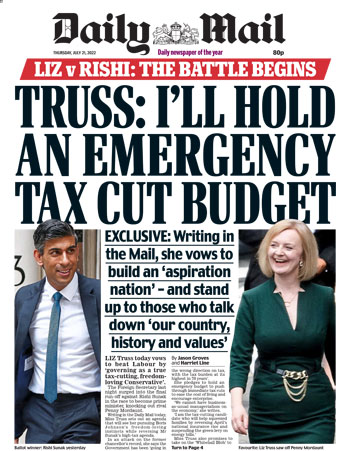
We’re down to the final two – Liz v Rishi. Mordaunt misses the cut by eight votes. To what extent that was due to the Mail’s campaigning - and whether we were denied a more effective prime minister or spared an even greater catastrophe – we shall never know.
The Mail buries the final figures in its exclusive splash: Truss writing for the Mail promising an emergency budget and her plans to build an aspiration nation and to stop people dissing our country.
Her bylined piece appears on page 4, with promises of immediate tax cuts and her confidence that she will beat Labour at the next election.
Further back, there are two spreads, Rishi being mocked for looking out of place in Birmingham, and a comparison of “smug head boy” and “Maggie’s sterner sister”. Glover likes Truss’s policies, but isn’t so sure about her presentation; the leader says ‘What a relief’.
It’s got the two candidates it wants, it’s up to members of course, but it’s clear who the Mail would prefer in No 10.
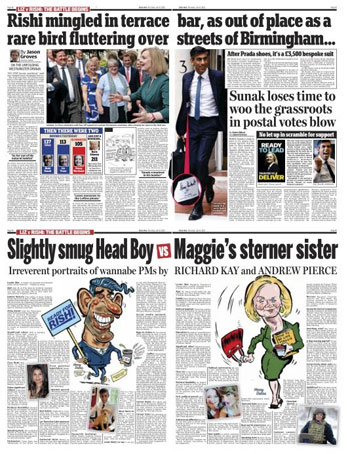
July 22
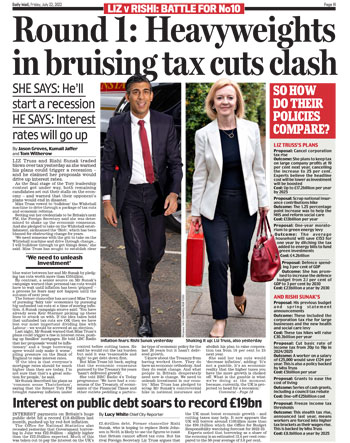
The leadership contest is pushed back in the book and reduced to four pages, starting on page 11. This has the two going head to head on tax policy, with Truss saying Sunak would bring recession, Sunak saying Truss would bring higher interest rates.
Truss – “I’m Labour’s worst nightmare” – gets centre stage on the only spread and, even though she’s now out of the running, Mordaunt comes under attack again on the final page, along with Sunak saying he’d continue with the privatisation of Channel 4.
The leader, with its prediction that the country’s economic future is at stake, is worth reproducing in full:
To readers heartily sick of the Conservative leadership circus, think yourselves lucky.
The political mayhem in Italy, where citizens must elect their 70th government in almost as many years, makes the Tory contest look a picture of stability.
Yet make no mistake: Severe economic turbulence awaits whoever becomes Britain's next prime minister. Debt interest payments have hit a record high and monthly government borrowing is at eyewatering levels, fuelled by soaring inflation.
The Mail is attracted to Liz Truss's plan to bulldoze the Whitehall 'blob' into immediate tax cuts, intending to boost economic growth and ease the spiralling cost of living. But with the nation's finances creaking so badly, will that be possible?
Rishi Sunak, meanwhile, wants to maintain fiscal responsibility - another traditional Tory value (even though he sprayed public money around like there was no tomorrow while chancellor). That would mean delaying tax cuts which could help painfully squeezed families.
This is why it is so vital to scrutinise the competing visions of the two candidates as they battle for the keys to No 10 - and not just naively swallow their grand promises. The economic future of Britain is at stake.
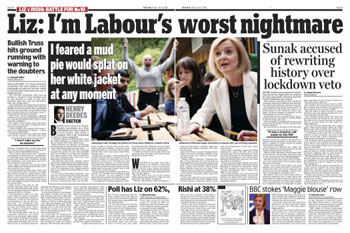
July 23
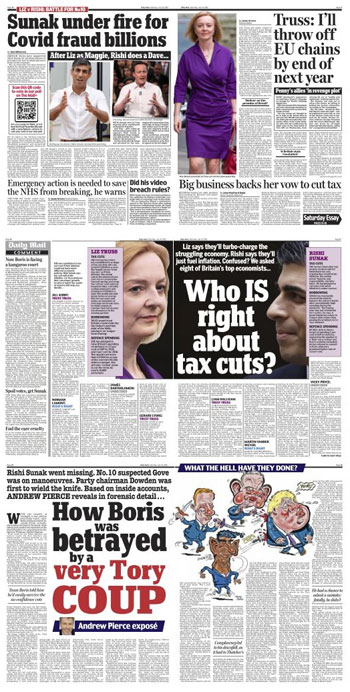
The race is again pushed back in the book, with three single pages: Sunak is “under fire for Covid fraud billions”, while Truss promises to “throw off EU chains”. There is still a lingering hope that Johnson could be added to the ballot paper.
Meanwhile, the Mail asks a panel of eight ‘experts’ to compare the two candidates’ economic policies. Four back Truss, two Sunak and two are undecided. The Truss backers include Patrick Minford, the inspiration for Trussonomics. Sunak supporters include Black Wednesday chancellor Norman Lamont.
Further back, for a Saturday treat, sits an Andrew Pierce exposé of how Johnson was “betrayed in a very Tory coup”. The first words in the strapline are “Rishi Sunak”.
July 25

The contest returns to the front with a Truss camp attack on Sunak over his attitude to China, while the inside spread is split between Truss promising to not to “cower” to European courts over our borders and a call to “Bring back Boris”. The leader is not convinced by anyone’s “tough talk” on borders.
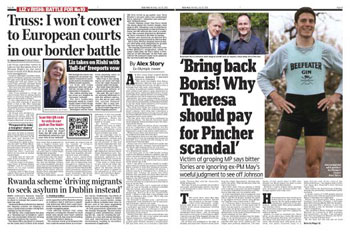
July 26
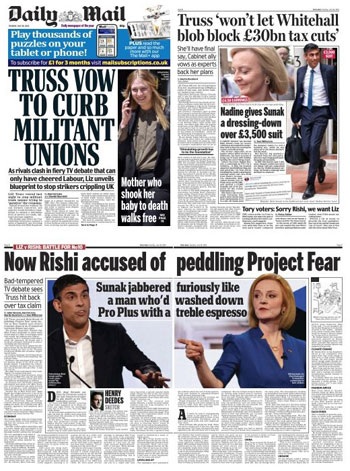
Another TV debate keeps the story on the front and Truss gets the splash again, vowing to curb militant unions. Inside, a spread accuses Sunak of a new Project Fear, while Truss has a page lead on countering the ‘Whitehall blob’. Nadine Dorries weighs in to criticise Sunak’s expensive suits and praise Truss’s economy earrings. The leader applauds Truss for her pledge to ‘take on the wreckers’.
July 27
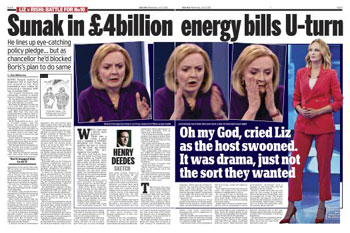
The contest moves back in the book, with Sunak on a £4bn energy bills U-turn and Truss saying she’ll force police to investigate real crimes, not Twitter rows. The big news of the day is TalkTV presenter Kate McCann fainting while hosting yet another TV debate and Truss first being aghast and then rushing to her aid.
The leader bemoans the lack of boosterism in the contest and urges both candidates to paint a more positive picture:
Now the IMF forecasts the UK will have the worst performing economy of any developed nation next year, the case for balancing the Covid-blighted books looks less important than sprinting for growth.
So Miss Truss's plan to turbocharge the struggling economy with immediate tax cuts if she becomes prime minister is right… Whoever wins the Tory race can drag Britain out of the economic mire by unshackling dynamic businesses in cutting edge sectors - and not selling them off to the highest foreign bidder. That, and channelling Boris's positivity, can help beat Labour.
July 30
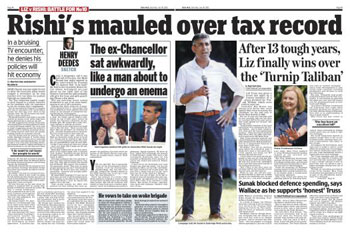
After a quiet couple of days, another TV debate is covered with another inside spread. This time the verdict is that Sunak has been “mauled over tax record” while Truss has won over the “turnip Taliban” after 13 long years. These are apparently people in her Norfolk constituency who don’t care for her.
The leader sees Truss growing into her campaign:
Her economic priorities are immediate tax cuts to stimulate growth, suspension of green levies and a bonfire of stifling regulation - music to the ears of many Tories…
Drawing on her Yorkshire upbringing, she says she has been channelling the spirit of the great Leeds United manager Don Revie. He embodied hard graft, self-belief and an unshakeable determination to win. Essential qualities in a football manger. Even more essential in a prime minister.
August
August 1

The Lionesses’ Euros triumph dominates, but the leadership contest makes a spread on 10 and 11 with Truss promising to free farmers from red tape and Sunak revealing a “radical” tax cut in “last bid to win votes”.
The leader applauds Truss for helping to fend off a “food apocalypse” and has kind words, too, for Sunak on plans to fine patients who miss NHS appointments. Both show that they are far superior to the cowardly and “achingly metropolitan” Starmer who might “struggle to identify basic farmyard animals”.
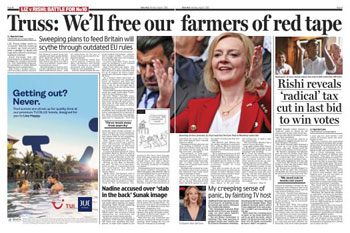
August 2
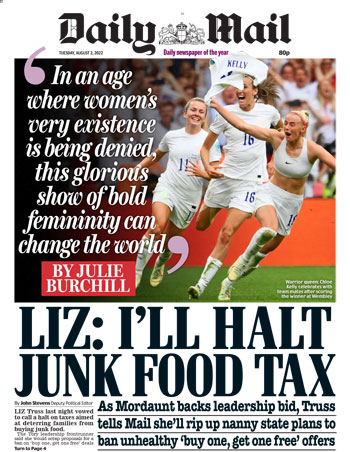
The ballot papers have gone out to Conservative party members and Truss has given an interview to the Mail that provides the paper with another splash. This time, it’s “I’ll halt junk food tax”. The sub-head and inside spread tell readers that the previously maligned Mordaunt is now in Camp Liz. A small story at the bottom of the spread has William Hague urging members to vote Sunak.
The leader celebrates Truss’s boosterism, comparing her promise of immediate tax cuts with Sunak’s talk of 4p off the basic rate of income tax by the end of the next parliament – “if a week is a long time in politics, seven years is a geological epoch”.
Truss, it says, is growing steadily stronger and clearly relishing the hustings:
Miss Truss has already proved as Foreign Secretary both her steadfast support for Ukraine in the face of Vladimir Putin's barbarism and her determination to stand equally firm against EU bullying over the Northern Ireland Protocol.
With each passing day, more senior Tories are declaring their support for Miss Truss - most recently former leadership contenders Penny Mordaunt and Nadhim Zahawi.
A Boris Johnson loyalist to the end, Miss Truss is mapping out a 'boosterist' agenda to take forward his legacy. It is clearly resonating with the parliamentary party and the grassroots membership.
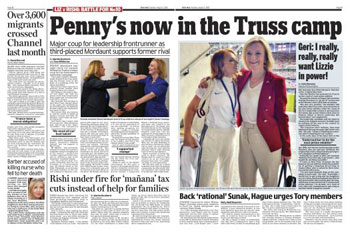
August 3
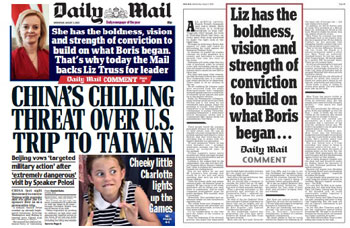
We’ve known where the Mail was heading all along and now it comes out and says it in a top-of-the-front blue panel and full-page leader: “the Mail backs Truss”.
The endorsement comes the day after Truss performs the first of her many U-turns, backing away from a suggestion that regional pay boards should be established so that public sector workers were paid less than those in the South. This is presented as a “despite” bit of a story that focuses on her growing poll lead.
The main story from the campaign is her pledge to lift the threat of jail over people who do not pay their TV licence. The story reports that three-quarters of the 114,000 people convicted of licence dodging in 2019 were women and that Truss was “alarmed at the number of women being locked up”. It does not report that you cannot be jailed for not having a licence – only for contempt if you refuse to pay the resultant fine. Only two people have been jailed over this since 2019.
But the big news for the Mail is its verdict that Truss should be prime minister. The election shouldn’t be taking place, Boris should still be in power, but the final two are worthy candidates and either would “wipe the floor with Sir Keir Starmer (aka Captain Crasheroonie Snoozefest)”:
Truss has grown in stature during the contest to become an authentic standard-bearer for low-tax, small-state Conservatism.
Blessed with Yorkshire grit, Miss Truss has the boldness, imagination and strength of conviction to tap into it and build on what Boris began… Most importantly, she can unite the party and end this depressing spasm of blue-on-blue warfare…
Success will require iron discipline in Downing Street and a government of all available talents – hopefully including Mr Sunak.
The “ocean-going dud” Starmer could cobble together a “gimcrack government “with the LibDems, SNP, Greens and the rest of the deluded Left, but we don’t doubt Miss Truss has the guts, gumption and guile to stop that happening…the Mail believes Miss Truss is able, willing and ready for the task.
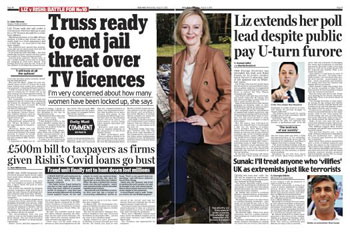
August 4
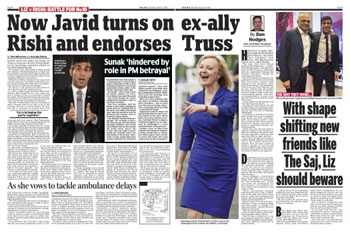
A quiet day. Sajid Javid changes camps to line up behind Truss and, with the Bank of England about to raise interest rates again, Alex Brummer says that all the doom and gloom about the economy is misplaced…
August 5
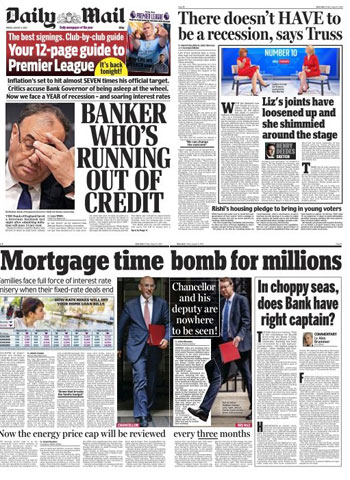
…But if there is a problem – such as a mortgage time bomb for millions – it’s all the fault of Andrew Bailey for not putting up interest rates earlier. The governor is running out of credit and Truss will review the Bank of England’s independence.
She also says there doesn’t have to be a recession and she is now “shimmying” on set for her appearance in the final TV debate. In this, she is going “face-to-face” with Sunak, but there is no sign of him on the page. The photograph is of Truss sitting down with Kay Burley, both in red dresses and high heels.
August 6
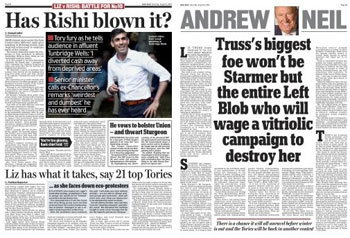
Business leaders and economists agree that the Bank of England is far too gloomy. Truss promises to do everything she can to help struggling families, while Sunak puts his foot in it by telling people in Tunbridge Wells that he had diverted funds from deprived areas.
Andrew Neil says the Left believes that Truss is “inexperienced, inconsistent, unimpressive, ill-informed, accident-prone, with a weak grasp of the facts and leaden in action, whether under attack or on the offensive”. He adds: “The Left is not entirely wrong.”
Neil believes that it is not Starmer’s Left that Truss has to worry about:
It is what is best described as the Left Blob, which is now omnipresent in British public life, dominant in the citadels of power, including most of the media (above all the broadcasters), the Civil Service, the NHS, the legal system (including the judiciary), education (especially the universities), social media, most public bodies and private charities. It's even wheedling its way into boardrooms.
Warming to his theme (which could have been the template for Truss’s anti-growth coalition riff at the party conference), he continues:
Truss has no idea what is about to be unleashed on her. Constant and vitriolic assaults on social media, especially by the deranged Twitterati, to rouse the mob.
A daily pounding on broadcast news, which has already largely decided it hates her. Relentless snide comments on BBC 'comedy' shows. Subtle put-downs from the panjandrums of grand public bodies. Not-so-subtle put downs from our cultural tsars.
In all this, The Blob will be assisted by Remain Tory grandees like John Major and Michael Heseltine who've already concluded she's a wrong 'un. Even Dominic Cummings, fresh from his (almost certain) failure to install Rishi Sunak as prime minister, will likely get in on the act.
Truss is vulnerable because she makes too many mistakes, too many U-turns and offers too many hostages to fortune. So she will need the strongest of chiefs of staff in Downing Street, one with experience and authority, to impose order on the Truss operation – but also to take her aside and tell her when she's about to make a mistake.
And he concludes:
It's a tall order. It's not clear she has it in her to do it. There is a chance it will all unravel before winter is out and the Tories would be back in yet another leadership contest, which will stretch voters' patience to breaking point.
August 8
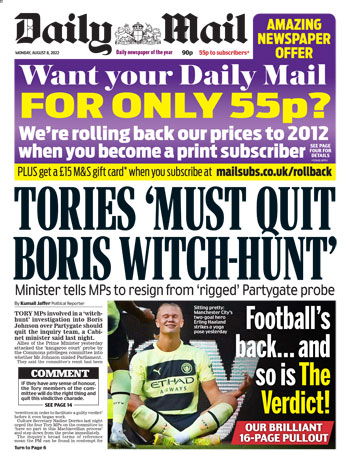
With Truss firmly ahead, the leadership contest takes a back seat to the Mail’s efforts to get the inquiry (kangaroo court) into whether Boris Johnson misled parliament, halted. But there’s still a spread on her promising to scrap the National Insurance increase the moment she moves into No 10.
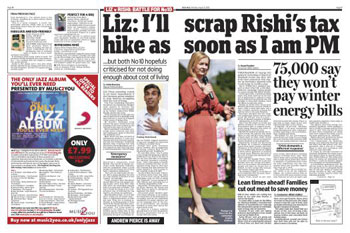
August 10
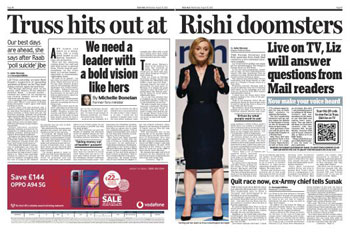
Truss has another pop at the Sunak “doomsters”. Stephen Glover has seen enough. Truss is going to win, and win handsomely. It’s time for Sunak to step aside so that she can get on with the job – “We need a functioning PM and we need her now.”
August 11
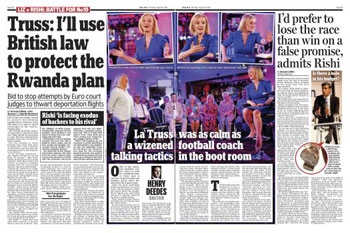
Truss wows her audience in a “laid-back” chat with GB News at a Greater Manchester working men’s club. And promises to “use British law” to send asylum seekers to Rwanda. The paper is hardly bothering to report anything Sunak says now as the race looks over and done with. He is facing an “exodus” of backers to his rival, but he says he’d rather lose than win on a false promise.
August 18
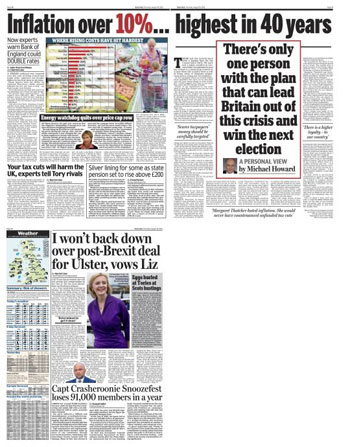
Inflation hits 10%, the highest for 40 years, and the Institute for Fiscal Studies says that tax-cutting plans are implausible and would harm the country. On the same spread, the Mail runs a guest column by Michael Howard, saying there’s only one person who can lead Britain out of the crisis and win the next election: Rishi Sunak.
Over the page, Truss promises not to back down in the dispute with the EU over the Northern Ireland protocol.
August 22
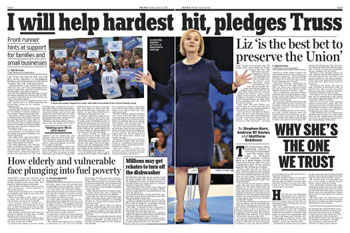
With the result of the contest pretty much done and dusted, the leadership race makes far fewer appearances in the Mail. But Truss gets a spread when she insists that she will help families and small businesses hardest hit by the rising cost of living.
August 26
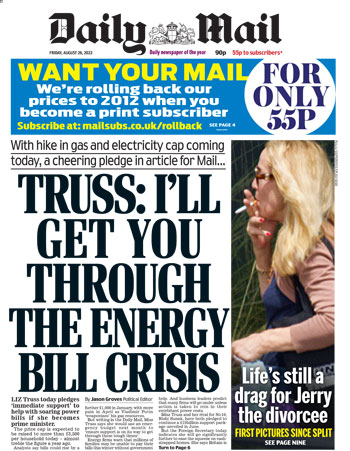
The new energy price cap is to be announced today, and is expected to mean average bills of around £3,500. So Truss writes another guest column to make a splash for the Mail, promising, “I’ll get you through energy crisis”. The lead story also points to her lifting the ban on fracking and speculation that putative chancellor Kwasi Kwarteng had a £100bn plan to freeze bills for two years, “but insiders played down the prospect of it being approved”. Rishi Sunak warns against “unfunded tax cuts”.
The leader endorses the strategy and says Truss must stick to her guns:
She must face down the irreconcilable eco-lobby and the obstructionists. Why not, though, win round communities living in the shadow of fracking operations or nuclear plants by offering them free energy?
For 30 years, successive governments have stuck their fingers in their ears and hoped the problem of Britain's energy needs simply disappeared.
Our woes show just how important it is that a Tory PM finally grasps the nettle.
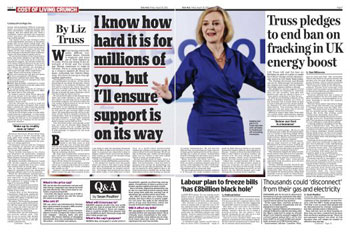
August 27
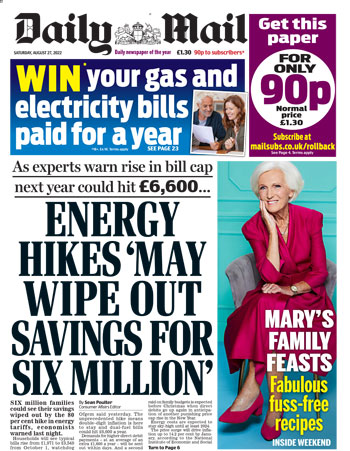
Energy prices dominate the news and make the splash and two spreads for the Mail. The two candidates for PM do not appear to have anything to say about this, but Jason Groves has a warning for Liz Truss and her stated dislike for handouts at the foot of one of the spreads.
Andrew Neil is back in the Saturday essay slot with another warning for her. Having cautioned Truss earlier this month that her biggest enemy would be not Starmer’s Labour but “the Left Blob”, Neil now tells her to watch out not for Labour MPs opposite, but the Tories behind her.
Careerists, One Nation Tories, hardline Brexiteers and backbenches full of “grandees” such as Gove, Sunak and Raab, will all be on her case. Keeping discipline would be difficult. Neil’s advice is to avoid gimmicks, to quietly ditch most of her campaign trail promises and to target help where it’s needed:
It’s a tall order, even for a prime minister of great experience and proven competence. Truss has neither attribute. But her own troops need to give her a chance. If they cut up rough from the start, they have no chance of succeeding.
The Tories are in the last-chance saloon. If they make a hash of this winter then the game is up. They won't have time to recover before an election.
The leader on the same page looks forward to the end of a “tortuous and needlessly vituperative leadership campaign” and proclaims that Truss has the imagination, boldness and fortitude to succeed in the top job. The Tories, it says, must show unity and competence. A PM needs to be able to get on with the job and not be looking over their shoulder for plotters.
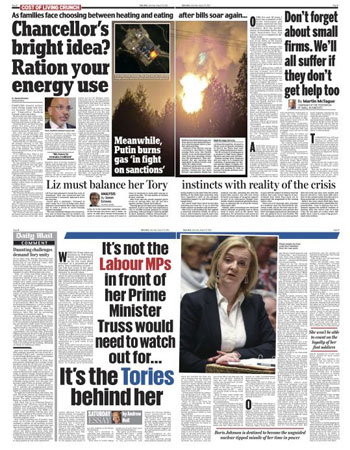
September
September 5
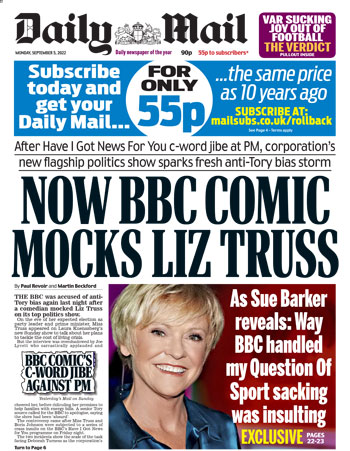
It’s results day. And the Mail is cross with the BBC for having Josh Widdecombe on Laura Kuenssberg’s inaugural Sunday politics show (Yesterday’s Mail on Sunday was cross with the BBC because Have I Got News for You host Jack Dee quoted a Tory MP calling Johnson the C-word). This accounts for a splash – “Now BBC comic mocks Liz Truss” – and a spread, while another spread has the PM-in-waiting promising that she won’t allow people to “talk this great country down”.
The leader is thankful that the contest is finally over and that Truss – who has been like a “caged animal” for the past few days – is ready to hit the ground running with a detailed plan to deal with soaring energy bills within a week and an emergency tax-cutting budget within a month:
Though the poorest will require most support, she stressed that tax cuts should not be seen just 'through the prism of redistribution'. They are for the benefit of all and intended to stimulate growth, she said. And with growth comes prosperity. As John F Kennedy famously put it, a rising tide lifts all boats.
This was once a fundamental principle of Conservatism but it has been obscured by the Covid emergency, during which massive state handouts became the norm. This has led to borrowing at levels never before seen in peacetime and took the national debt to nearly £2.4trillion – money that will have to be repaid by future generations.
Miss Truss is right to stress that it is only through growth and improved productivity that this mountain of debt will be reduced and the public finances put back on track.
We cannot and should not expect state handouts to cover every misfortune…
But we are not, as the professional catastrophists love to present it, approaching some kind of Armageddon. There is nothing we haven't faced and come through in the past.
Miss Truss promised to be honest with the country about the scale of the problems ahead. But like Boris Johnson, she has faith that, together, we will overcome them…
Through her vision, energy and initiative, the Tory fightback can begin today.
